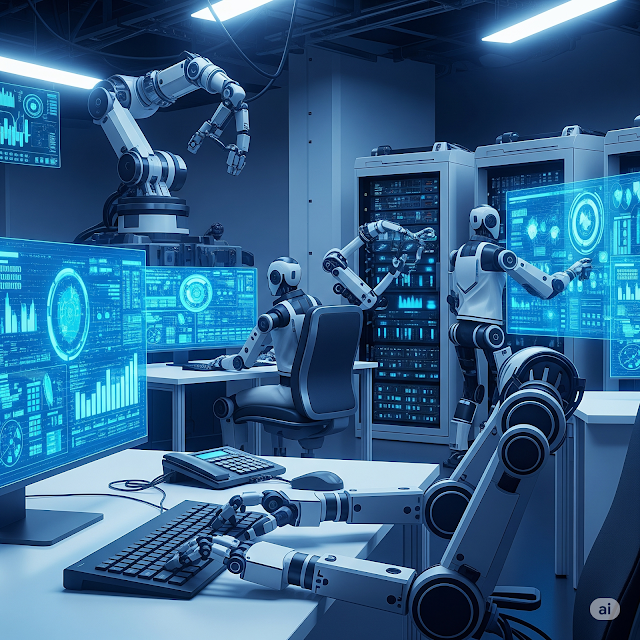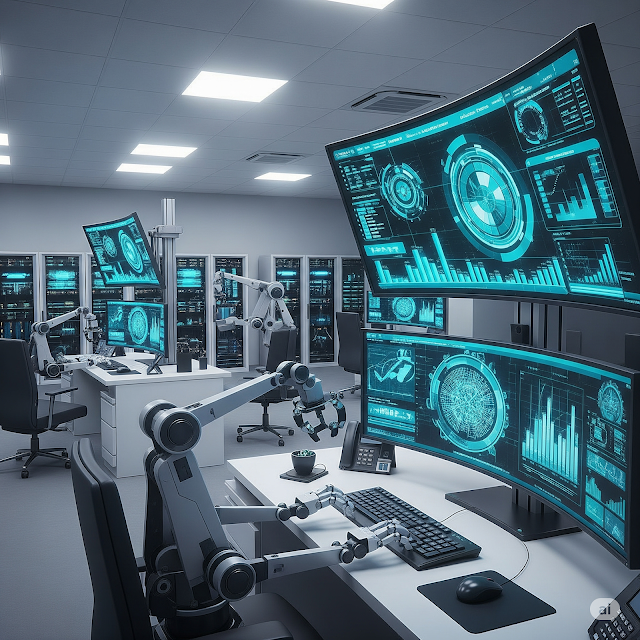The AI Revolution is Here: Will You Be a Spectator or a Participant in the New Job Market?
It was a Tuesday morning when Sarah, a seasoned graphic designer with over a decade of experience, first felt a pang of uncertainty. A client, who had always praised her creative intuition, mentioned an AI image generator that could produce stunning visuals in seconds. Sarah, for the first time, wondered if her creativity, her passion, and her livelihood were on a collision course with a machine.
This story isn't unique to Sarah. Across the globe, professionals from all walks of life are looking over their shoulders at the rapidly advancing capabilities of Artificial Intelligence. The whispers of "AI will take our jobs" have grown into a resounding chorus, leaving many feeling anxious about their future. But is the rise of AI a harbinger of mass unemployment, or is it the dawn of a new era of human-machine collaboration and unprecedented career opportunities?This post will delve into the heart of this question, offering an analytical yet personal look at the jobs most susceptible to AI's influence and the exciting new roles it's creating. We'll explore the data, hear from those who have already felt the impact, and provide a roadmap for not just surviving, but thriving in the age of AI.
The Shifting Landscape: Jobs on the Frontline of AI Disruption
It's true, some jobs, particularly those that involve repetitive tasks and data processing, are facing a significant transformation. According to a report from the
Jobs with High Exposure to AI Automation:
- Data Entry and Administrative Roles: AI's ability to process and organize vast amounts of information with speed and accuracy puts roles like data entry clerks, administrative assistants, and receptionists at high risk of automation.
- Customer Service Representatives: AI-powered chatbots and virtual assistants are becoming increasingly sophisticated, capable
1 of handling a wide range of customer inquiries and support2 tasks. - Manufacturing and Assembly Line Work: Robots and AI-driven systems have long been a feature in manufacturing, and their capabilities continue to expand, performing physical tasks with precision and endurance.
- Certain Financial and Analytical Roles: Tasks like financial analysis, market research, and accounting can be significantly augmented, and in some cases, automated by AI that can identify trends and process data faster than humans. A study by
Goldman Sachs - Translation Services: While human nuance remains crucial, AI-powered translation tools are becoming remarkably accurate for more straightforward translation needs.
A User's Story: The Coder's New Reality
"I've been a software developer for 15 years," shares a user on a popular online forum. "For a while, I was dismissive of AI's coding abilities. Now, I use an AI assistant every day to write boilerplate code, debug, and even suggest more efficient algorithms. It hasn't replaced me, but it has fundamentally changed how I work. The developers who refuse to adapt are the ones who will fall behind."
This experience highlights a crucial point: AI's impact isn't always about outright replacement. Often, it's about augmentation, freeing up humans to focus on more strategic and creative aspects of their roles.
The Dawn of New Professions: Careers Forged in the Fires of AI
For every job role that AI disrupts, new and often more exciting ones emerge. The demand for individuals who can build, manage, and ethically guide AI is skyrocketing.
Emerging Job Opportunities in the AI Era:
- AI and Machine Learning Specialists: These are the architects of the AI revolution, designing and building the intelligent systems that are reshaping industries. The U.S. Bureau of Labor Statistics projects a robust growth for roles in computer and information technology, including those directly related to AI development.
- Data Scientists and Analysts: In a world awash with data, those who can interpret it and extract meaningful insights are invaluable. AI generates more data, and we need more skilled professionals to make sense of it.
- Prompt Engineers: A role that didn't exist a few years ago, prompt engineers specialize in crafting the perfect instructions for AI systems to generate desired outputs, from creative text to complex code.
- AI Ethicists and Governance Specialists: As AI becomes more integrated into society, ensuring it operates fairly, transparently, and without bias is paramount. This has created a demand for professionals who can navigate the ethical complexities of AI.
- AI Trainers and Conversation Designers: Someone has to teach the AI! These roles involve refining AI models and designing natural, effective interactions between humans and machines.
Navigating Your Career in the AI Age: A Friendly Advisor's Guide
The future of work isn't about humans versus machines; it's about humans with machines. The key to not just surviving but thriving is to embrace a mindset of continuous learning and adaptation.
- Embrace Lifelong Learning: The skills required in the workforce are evolving at an unprecedented pace. Be proactive in learning new skills, especially those that are complementary to AI.
- Develop Your "Human" Skills: Creativity, critical thinking, emotional intelligence, and complex problem-solving are abilities that AI, in its current form, cannot replicate. Honing these skills will make you an indispensable asset.
- Become AI-Literate: You don't need to become a programmer, but understanding the basics of how AI works and how to use AI tools relevant to your field will give you a significant advantage. Think of it as the new computer literacy.
- Focus on Strategic Thinking: Let AI handle the repetitive tasks while you focus on the bigger picture, on strategy, innovation, and building relationships.
The story of our workforce is one of constant evolution. The agricultural revolution pushed us towards industry, and the industrial revolution towards knowledge work. The AI revolution is the next chapter. By understanding the landscape, embracing new skills, and focusing on our uniquely human strengths, we can all find our place in this exciting new world. Sarah, the graphic designer, didn't quit. Instead, she started learning how to use AI as a tool to enhance her creativity, generating ideas and handling mundane tasks faster, allowing her to focus on the truly artistic aspects of her work. Her story, and countless others like it, show us that the future is not to be feared, but to be built.





